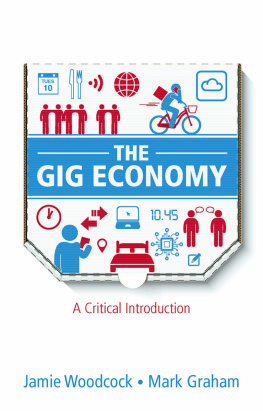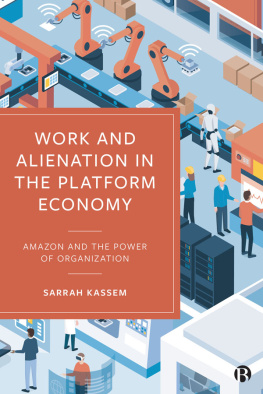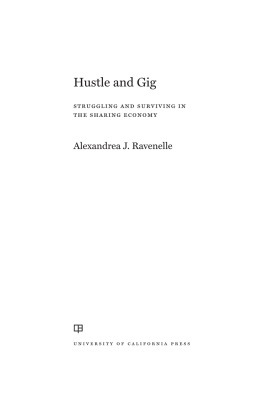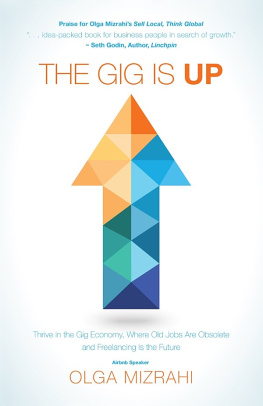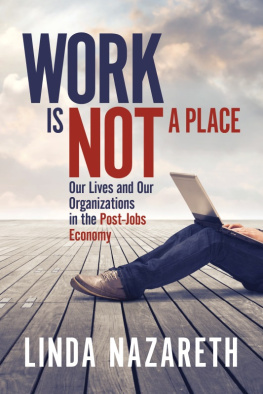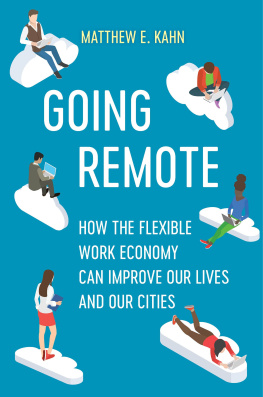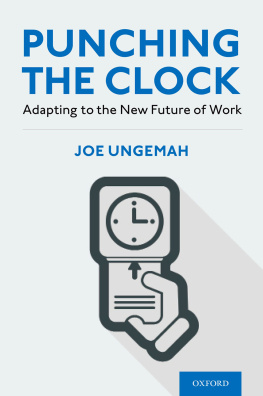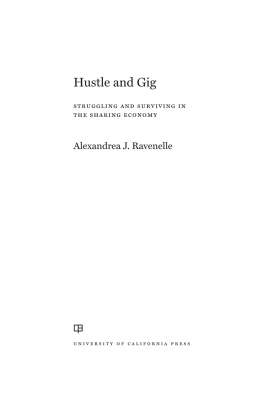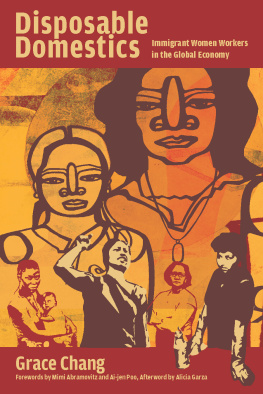
The Gig Economy
A Critical Introduction
Jamie Woodcock
Mark Graham
polity
Copyright Jamie Woodcock and Mark Graham 2020
The right of Jamie Woodcock and Mark Graham to be identified as Authors of this Work has been asserted in accordance with the UK Copyright, Designs and Patents Act 1988.
First published in 2020 by Polity Press
Polity Press
65 Bridge Street
Cambridge CB2 1UR, UK
Polity Press
101 Station Landing
Suite 300
Medford, MA 02155, USA
All rights reserved. Except for the quotation of short passages for the purpose of criticism and review, no part of this publication may be reproduced, stored in a retrieval system or transmitted, in any form or by any means, electronic, mechanical, photocopying, recording or otherwise, without the prior permission of the publisher.
ISBN-13: 978-1-5095-3637-5
A catalogue record for this book is available from the British Library.
The publisher has used its best endeavours to ensure that the URLs for external websites referred to in this book are correct and active at the time of going to press. However, the publisher has no responsibility for the websites and can make no guarantee that a site will remain live or that the content is or will remain appropriate.
Every effort has been made to trace all copyright holders, but if any have been overlooked the publisher will be pleased to include any necessary credits in any subsequent reprint or edition.
For further information on Polity, visit our website: politybooks.com
Acknowledgements
We would first like to thank George Owers for commissioning and then supporting the book throughout the whole process, as well as Julia Davies and the rest of the team at Polity. We would also like to thank our three anonymous reviewers for their critical and constructive feedback. We are very grateful to Adam Badger who worked with us to source background material for the book and provided many insights and suggestions along the way. Adam is a wonderful colleague to work with on this sort of project. Thanks as well to David Sutcliffe for his extensive editorial support and always sharp suggestions, and to Ian Tuttle for his careful copyediting.
Giorgio Marani patiently worked with us on many drafts to get just right, and we appreciate his skill and attention to detail in the final product. The fantastic illustrations in the final chapter were made by John Philip Sage. Thank you for visualizing the futures we hope to travel towards.
We owe an important thanks to the German Federal Ministry for Economic Cooperation and Development (BMZ) and the Deutsche Gesellschaft fr Internationale Zusammenarbeit (GIZ), as well as the ESRC (ES/S00081X/1) for supporting our research in this area. We would like to acknowledge also the Leverhulme Prize (PLP-2016-155), the European Research Council (ERC-2013-StG335716-GeoNet), and The Alan Turing Institute (EPSRC grant EP/N510129/1) for their ongoing support.
The book has drawn on previous and ongoing research projects at the Oxford Internet Institute. We are particularly thankful to the Fairwork team, including Sandy Fredman, Paul Mungai, Richard Heeks, Darcy du Toit, Jean-Paul van Belle and Abigail Osiki on the South African project; Balaji Parthasarathy, Mounika Neerukonda and Pradyumna Taduri in India; Sai Englert, Adam Badger and Fabian Ferrari in the UK; as well as Noopur Raval, Srujana Katta, Alison Gillwald, Anri van der Spuy, Trebor Scholz, Niels van Doorn, Anna Thomas and Janine Berg many of whom also discussed the ideas and offered feedback on the manuscript. We also owe a debt of gratitude to our brilliant colleagues at the Oxford Internet Institute who apply a critical lens to digital work and the gig economy. We especially wish to thank Amir Anwar and Alex Wood for the many collaborations and conversations that have shaped our thinking on this topic. But we also acknowledge the rest of our research cluster for collectively building a research environment so conducive to critical, innovative and engaged research into the digital economy. Thank you to Sanna Ojanper, Michel Wahome, Sai Englert, Adam Badger, Martin Dittus, Joe Shaw, Margie Cheesman, Marie-Therese Png, Fabian Braesemann, Chris Foster, Stefano de Sabbata and Ralph Straumann.
In addition, we would like to thank Phil Jennings, Abigail Hunt, Sanna Ojanper, Nick Srnicek, Alessandro Gandini, Callum Cant, Wendy Liu, Robert Ovetz, Darcy du Toit, Sandy Fredman, Marc Thompson and Jason Moyer-Lee for taking the time to read an earlier draft of this book and for offering their incredibly valuable insights and feedback on the manuscript. Any faults or omissions are of course only our own. We are grateful to the role played by Antonio Casilli and ENDL in building a community of scholars focused on digital labour: a community that provided a fertile group for discussions that shaped this book. We would also both like to acknowledge Six Silberman and Christina Colclough for their support and friendship over the last few years. It has inspired and shaped much of the work we do.
Jamie would like to thank Lydia for her continuing and invaluable support, both in general and with more book writing projects. He would also like to thank the editors of Notes from Below who offered feedback as well as ongoing theoretical and practical inspiration. Callum Cants Riding for Deliveroo (which is due to be published at the same time as this book) has been an important influence on making sense of the gig economy from the perspective of workers. Mark would like to thank his family. Jean Graham for raising a family whilst working in the gig economy. Thanks for your endless support to all of us despite all the challenges you have encountered as a precarious worker. And thanks to Kat: for always being a steady source of wisdom, advice and good humour no matter how difficult a day of work has become.
Finally, we would like to thank all of the workers we have spoken to and whose voices we have tried to feature within the book. Ultimately, this is a book about hope for fairer futures of work. As such, we dedicate it to the workers whose stories are not already written.
Introduction
Everybody is talking about the gig economy. From newscasters to taxi drivers to pizza deliverers to the unemployed, we are all aware of the changes to our jobs, our professions, our economies and our everyday lives wrought by the gig economy. There are now an estimated 1.1 million people in the UK working in the gig economy, delivering food, driving taxis and offering other services this is as many people as work for the National Health Service (Balaram et al., 2017). Eleven per cent of workers in the UK have earned income from working on digital labour platforms (Huws and Joyce, 2016), while 8 per cent of Americans worked on a gig platform in 2016, rising to 16 per cent for the 1829 age bracket (Smith, 2016). An increasingly common feature of the gig economy is the use of digital labour platforms tools that allow employers to access a pool of on-demand workers. It is predicted that by 2025, one-third of all labour transactions will be mediated by digital platforms (Standing, 2016). Around the world, the number of people who have found work via platforms is estimated to be over 70 million (Heeks, 2017). Even more headline-grabbing are the numbers released in a 2015 study by McKinsey:
Up to 540 million people could benefit from online talent platforms by 2025. As many as 230 million could find new jobs more quickly, reducing the duration of unemployment, while 200 million who are inactive or employed part time could gain additional hours through freelance platforms. As many as 60 million people could find work that more closely suits their skills or preferences, while an additional 50 million could shift from informal to formal employment. (Manyika et al., 2015)
Next page
